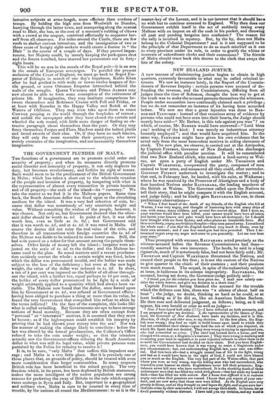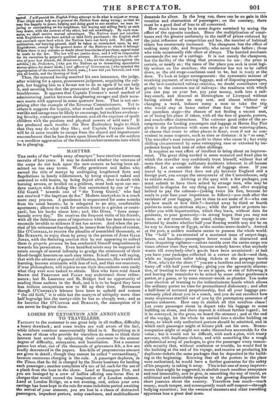NEW ZEALAND JUSTICE.
A NEW manner of administering justice begins to obtain in high quarters, extremely favourable to what may be called criminal in- terests. We saw an instance lately, in the Report of the Commis- sioners of Revenue Inquiry : certain persons were accused of de- frauding the revenue, and the Commissioners, differing from all judges since the time of Solomon, thought the best way to get at the truth was to make the accused persons themselves the witnesses. People under accusation have continually claimed such a privilege ; but we do not remember an instance of its having been accorded before. We now see that a great injustice was done to BAR- BER and FLETCHER : instead of that vexatious array of evidence by persons who could not have seen into their hearts, the Judge should merely have said—" Mr. Barber, is this tale against you true"? on which, of course, Mr. BARBER would have answered—" Lord bless you! nothing of the kind : I was merely an industrious attorney honestly employed "; and that would have acquitted him. In the same way, FLETCHER might have given his own evidence that he acted only from the most benevolent motives in aiding claimants of stock. The new plan, we observe, is carried out at the Antipodes, by Captain FITZROY, Governor of New Zealand; who discharges the judicial office with peculiar unction. It will be remembered that two New Zealand chiefs, who resisted a land-survey at Wai- rao, set upon a party of English under Mr. THOMPSON and Captain WAKEFIELD, overpowered the party, composed of men unused to bear arms, and massacred all they could, after surrender. Governor FITZROY undertook to investigate the matter; and to that end, in February last, he landed, with his suite, at Waikanae; where he was received by the Protector of Aborigines and a body of four hundred Natives under RAUPlRAHA, the leading murderer of the British at Wairao. The Governor called upon the Natives to tell their story, that he might compare it with the English account, and judge fairly; and he kindly gave BATIPARAIIA. his cue, in these preliminary observations- " When 1 first heard of the death of my friends, of the English who fell at Wairao, I was very angry, and thought of hastening here with many ships of war, with many, many soldiers, and several fire-moved ships. Had I done so, your warriors would have been killed, your canoes would have been all taken and burnt, your houses and palls would have been all destroyed ; for I should have brought with me from Sydney and other places an irresistible force. But these were hasty, angry, unchristian thoughts—they soon passed away. I considered the whole case : I saw that the English had been very much to blame, even by their own account ; and I saw how much you had been provoked. Then I de termined to put away my anger and come to you peaceably. Let me now hear your story."
Thus prompted with excuses, RAUPARAHA acted precisely as the witness-accused before the Revenue Commissioners had done— roundly asserted his own innocence. The lands, he said in a long rigmarole, much of it notoriously false, had not been fairly sold ; Mr.. THOMPSON and Captain WAKEFIELD threatened the Natives, and caused their people to fire first ; it is not the custom of the Natives to give quarter to the chiefs of their enemies ; and their passions were much roused. The sequel, in spite of the melancholy subject at issue, is ludicrous in its solemn impropriety. RAUPARARA, the accused, having sat down, the Governor-judge politely said- " I thank you for the relation you have given me. I shall now calmly con- sider the whole matter, and give my decision in a short time." Captain FITZROY having thanked the accused for the trouble which the defence cost him, there was "a silence of about half an hour " ; the judge no doubt, thinking as hard as he could, or at least looking as if be did so, like an American Indian Sachem. He then rose and delivered judgment, as follows; being, as it will appear, his own herald or crier as well as judge- " Now I have heard both sides (!! !)—I have reflected on both accounts, and I am prepared to give my decision. I, the representative of the Queen of Eng- land, the Governor of New Zealand, have made my decision, and it is this. Hearken, 0 chiefs and elder men, to my decision. In the first place, the Eng- lish were wrong ; they had no right to build houses upon lands to which they had not established their claim—upon land the sale of which you disputed, on which Mr. Spain had not decided. They were wrong in trying to apprehend you, who had committed no crime. [The chief had burned down a house, and was charged with arson, on a Magistra:e'e warrant.] They were wrong in marking and measuring your land in opposith.n to your repeated refusals to allow them to do so until the Commissioner had decided on their claim. Had you been English- men, you would have known that it was wrong to resist a Magistrate under any circumstances; but, not understanding English law, your case was differ- ent. Had this been all—had a struggle caused loss of lite in the fight, wrong and bad as it would have been in the sight of God, I could not have blamed you so much as the English. The very bad part of the Wairao affair, that part where you were so very wrong, was the killing men who bad surrendered, who trusted to your honour as chiefs. Englishmen never kill their prisoners; Eng- lishmen never kill men who have surrendered. It is the shocking death of those unfortunate men that has filled my mind with gloom—that has made my heart so dark—that has filled me with sorrow. But I know how difficult it is to restrain angry men when their passions are roused. 1 know that you repent of your con- duct, and are now sorry that those men were killed. As the English were very greatly to blame, and as they brought on and began the fight, and as you were laue-. ried into crime by their misconduct, I will not avenge theirdeath. In future, let ne dwell peaceably without distrust. I have told you my decision, and my word is. sacred. I will punish the English if they attempt to do what is unjust or wrong. Your chiefs mast help me to prevent the Natives from doing wrong; so that we May live happily in peace, helping and doing good to one another, no man in- juring or encroaching on his neighbour, but buying and selling freely as each may desire, with the consent of the other, but not unwillingly. By such mea- sures, we shall receive mutual advantages. The Natives must not interfere with Englishmen who have settled on land fairly purchased ; the English shall not encroach upon land which the Natives have not fairly sold. No pab, nor oultivation, nor burying-ground, shall be taken or encroached upon, by any Englishman, except by the general desire of the Natives to whom it belongs. Where there is any mistake or doubt about boundaries of purchase, appeal must be made to the law. The law will see justice done, and 1 will be responsible for its execution by properly qualified persons. Recommending you to the ad- vice of your best friends, the Missionaries, [who set the aborigines against the settlers,] the Protectors, [who put the Natives up to demanding speculative money-prices for desert lands,] and officers of Government, [who impeded the appropriation of the reserves for Native usesd I now bid you farewell, and wish you all health, and the blessing of God." Thus, the accused having asserted his own innocence, the judge, after winking for a space, pronounces judgment, acquitting the cul- prit, but begging him as a favour not to do so again if be can help it, and assuring him that the prosecutor shall be punished if he be troublesome. It appears that Captain FITZROY'S novel method of administering justice between slaughtering savages and their accu- sers meets with approval in some quarters here. That is not sur- prising after the example of the Revenue Commissioners. Yet to others it suggests the inquiry, what would such conduct towards a warlike and savage race be likely to encourage, but reckless overbear- ing ferocity, extravagant encroachment, and all the caprices of spoilt children with the passions and physical powers of wild men ? It has produced such results : the New Zealanders begin to think that they may do what they like ; and Captain FITZROY himself will be at some trouble to escape from the absurd and importunate encroachment that he has drawn upon himselfas well as the settlers —a needless aggravation of the financial embarrassments into which he is plunging.



























 Previous page
Previous page